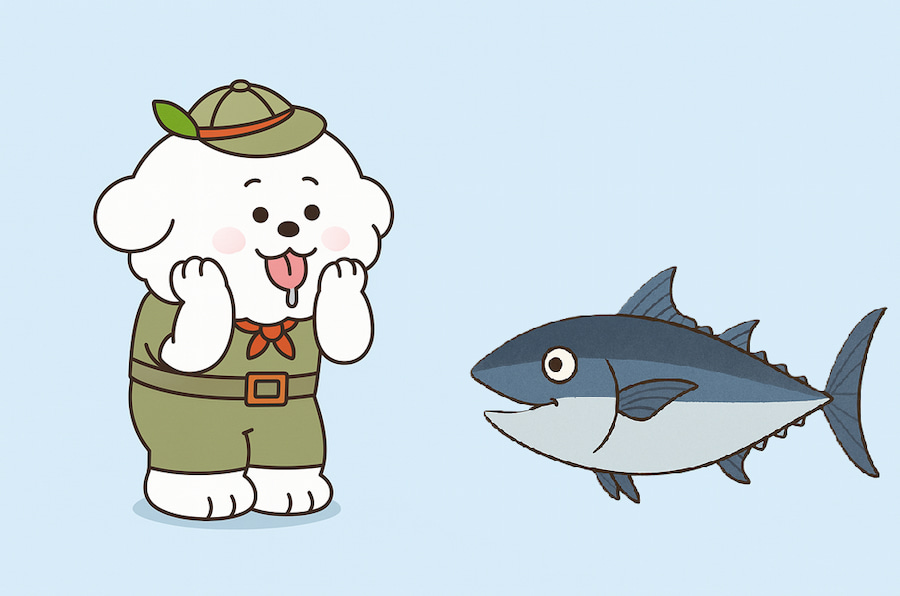As a pet parent, one often gets confused when offering certain foods to their pet. When it comes to offering a healthy diet to your dog, then how about sharing some delicious and healthy fruits with your furry friend?
If you want to know can dogs eat persimmon, then this detailed article will help you out. Persimmon is a sweet and flavorful fruit rich in nutrients and vitamins, but when it comes to your canine companion, then it’s important to know whether persimmon is safe for dogs to eat or not. This article explains the different aspects of whether dogs can eat persimmon and, in particular, whether ripe persimmons are safe for dogs to eat.

Lee&Pol provides ripe persimmons with dried pollock, thoroughly removing salt and bones over 24 hours to make a safe treat for your dog!
Can Dogs Eat Ripe Persimmon?
Yes, dogs can safely eat ripe persimmons. Ripe persimmons are soft in texture and sweet in taste. They contain beneficial nutrients that are good for your dog’s health.

However, it’s important to know the risks associated with specific parts of persimmon and the safe ways to prepare this fruit before feeding it to your dog.
Is Ripe Persimmon Good For Dogs?
Ripe persimmons are highly nutritious and loaded with vitamins and minerals. They are a good source of vitamins such as Vitamin A and Vitamin C and have a good amount of dietary fiber. All of these contribute to your dog’s immune system, improve digestion, and promote healthy skin.
Benefits of Ripe Persimmon for Dogs
Ripe persimmons have great nutritional value, and they are good for your dog’s health, contributing to his overall well-being. Let’s have a look at the various advantages of adding ripe persimmons to your dog’s diet.
1. Rich in Nutrients
Ripe persimmons are full of essential vitamins and minerals.
- Vitamin A: It boosts the immune function and is good for your dog’s skin and eye health. It helps to maintain healthy vision, especially in old-age dogs.
- Vitamin C: It supports the immune system because of the antioxidants that help to reduce inflammation and promote healing in your dog.
2. High in Fiber
Ripe persimmons have a good fiber content that regulates the digestive system of your dog. It’s also good for the following things:
- Healthy bowel movements: It helps in digestion and prevents constipation. When your dog’s diet has fibre content, then it provides regularity and prevents the digestive issues in dogs.
- Weight management: Fiber gives a feeling of fullness for a longer time, which means it helps to lose weight in obese dogs by managing the caloric intake in dogs.
3. Antioxidant Properties
Ripe persimmons have different antioxidants that include flavonoids and carotenoids that reduce oxidative stress in pets and prevent chronic diseases like arthritis and different allergies.
4. Hydration
Ripe persimmons have good water content that keeps the dog hydrated, especially during hot weather and after exercises and training sessions.
5. Supports Heart Health
Potassium found in ripe persimmons helps to maintain healthy blood pressure levels. That’s why offer a diet rich in potassium for the good heart health and cardiovascular function of your dog.
6. Promotes Healthy Skin and Coat
The antioxidants and vitamins found in ripe persimmons contribute to healthy skin and a shiny coat in dogs.

How to Feed Ripe Persimmon to Dogs?
Persimmons can be a delightful treat for your dog when served correctly. First of all, make sure that you select a fully ripe persimmon that feels soft to touch and has a fresh orange color. Now wash the fruit thoroughly to remove any dirt or pesticides. Then cut the persimmon in half and remove the seeds because the seeds can cause choking hazards in dogs. It is advised to peel off the skin because dogs can find it hard to digest. Now cut the ripe persimmons into small bite-sized pieces and serve it to your dog. Begin with the small amount and carefully monitor your dog’s behavior for any adverse reactions.
The best way to serve persimmons is by mixing small pieces of this fruit with your canine’s regular food and letting him experience this new flavor. Always remember that treats such as persimmon should not be more than 10% of your dog’s daily caloric intake. If you have any concerns regarding this fruit, then it is advised to consult your veterinarian for the health and overall well-being of your dog.
Things to Keep in Mind When Feeding Ripe Persimmon to Your Dog:
Here are some things to keep in mind when giving treats to your dog.
1. Choose the Ripe Fruit
Fully ripe persimmons are safe for dogs to eat. Avoid the unripe persimmons because of the high levels of tannins that are harmful to dogs.

It’s best to choose a ripe persimmon that soft and has a distinct orange color.
2. Carefully Remove Seeds and Peel Off The Skin
Always remove the seeds and peel off the skin before you offer persimmons to your dog. The seeds can cause choking hazards and intestinal blockages. However, the skin of ripe persimmon is hard for dogs to digest.
3. Moderation Is The Key
Always introduce persimmon once gradually to your dog’s diet and observe how your dog reacts to the small amounts served. Overfeeding of a fruit is likely to cause gastrointestinal upset.

Lee&Pol freeze-dries ripe persimmons, carefully removing the seeds and peel to make safe and healthy treats for your dog!
How Much Persimmon Can A Dog Eat?
Persimmons are safe for dogs as an occasional treat. Always feed persimmon to dogs according to their weight.
- For small dogs (under 20 lbs.): 1-2 small pieces
- For medium dogs (21-50 lbs.): 2-4 small pieces
- For large dogs (51-100 lbs.): 4-6 small pieces
Can Dogs Eat Persimmons Everyday?
Ripe persimmons are a healthy treat for your dog, but they should not be an everyday staple of your dog’s diet. Always serve in moderation because excess of this fruit will cause digestive issues in your dog. Remember that your dog has a balanced diet and only 10% of the treats.
Does Ripe Persimmon Cause Constipation?
Serious concern for the pet owners regarding ripe persimmons is whether they cause constipation in dogs or not. Remember that ripe persimmons are not known to cause constipation; in fact, they aid indigestion due to the high fiber content in them. Keep in mind that the unripe fruit has a high content of tannins that cause digestive problems, and constipation is one of them.
Understanding Tannins: What Are the Symptoms of Tannin Toxicity in Dogs?
Tannins are polyphenolic compounds found in different fruits, and unripe persimmons are one of them. Tannins absorb moisture in the intestines, so excessive consumption causes the stool to harden, leading to constipation. That is why it is advised not to feed unripe persimmons to your dog because of the high levels of tannins in them.

Tannins found in unripe persimmons can cause toxicity in dogs. Look for the symptoms of tannin toxicity that include vomiting, diarrhea, and stomach discomfort.
Side Effects Of Excessive Feeding Of Ripe Persimmons To Dogs
Overfeeding of persimmons can cause excessive side effects in dogs. As we know, ripe persimmons have fiber content, so excessive feeding of persimmons will likely cause gastrointestinal upset, vomiting, diarrhea, bloating, or cramps.
The natural sugars in ripe persimmons will contribute to weight gain and dental issues when offered frequently. You will notice changes in your dog’s behaviour, such as lethargy and restlessness, because of overconsumption of ripe persimmons. That’s why you should ensure that persimmons only form a small portion of your dog’s diet in order to avoid serious health issues.
Are There Any Risks Of Weight Gain From OverFeeding Persimmons?
Overfeeding of persimmons leads to weight gain in dogs because of the high sugar content found in rip persimmons. Overfeeding will make your dog obese due to excess calories in his diet. Always keep in mind that although persimmons are highly nutritious, they are not a low-calorie treat. So always serve persimmons to your dog in moderation and only as an occasional treat; otherwise, it will cause weight gain. As a result, your dog will get serious health issues such as diabetes, heart diseases, liver diseases, kidney diseases, and joint problems like patella luxation.
Can Persimmons Affect My Dog’s Blood Sugar Levels?
Yes, overfeeding of persimmons has a great impact on your dog’s blood sugar levels. Ripe persimmons contain carbohydrates that cause a spike in blood sugar level.

Diabetic dogs will experience a sudden increase in their blood sugar, leading to health complications in the long run.
Conclusion
Ripe persimmons are a healthy and nutritious treat for dogs when prepared in the right way. They have lots of nutritional benefits, including vitamins, minerals, and fiber. Remember to serve the ripe persimmons gradually and in moderation. Remove the seeds and peel off the skin before you serve. It’s always advised to consult your veterinarian before introducing a new food to your dog’s diet. I hope by following these guidelines you will enjoy this delicious and ripe fruit with your loyal companion.
FAQ
No, persimmon seeds are not safe for dogs to eat. They have a high risk of causing choking hazards and intestinal blockages. So it is advised to remove the seeds before feeding persimmons to your dog.
Ripe persimmon skin is not toxic but is hard for dogs to digest. Ensure that you remove the skin of a ripe persimmon so that it becomes easier to digest and prevents potential gastrointestinal issues as well.
Dogs can eat dried persimmon. Persimmons are dried without adding any additional ingredients.
The diabetic dogs generally should avoid fruits high in sugar content, including persimmons. Always consult your vet before introducing a new fruit to your dog’s diet, especially if he is diabetic.
For dogs with known food allergies, it’s always advised to consult your vet before introducing persimmons. Although this fruit does not cause any allergic reaction, as we all know, every dog is unique, and it’s necessary to ensure their safety, and for that, a vet consultation is compulsory.
Ripe persimmons are a healthy treat for dogs, but dogs that have sensitive stomachs will react differently upon eating persimmons. It is advised to always introduce persimmons gradually in small amounts because your dog may experience digestive upset even when eating safe foods.



